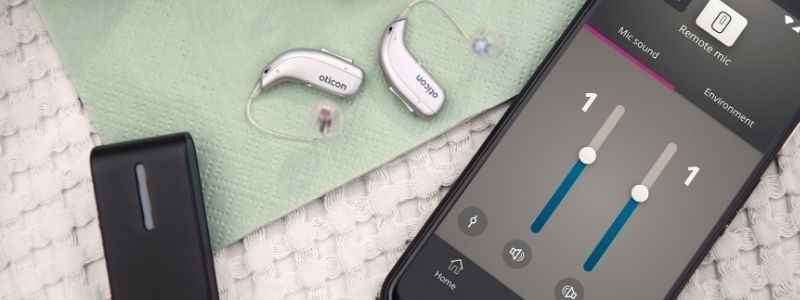Free home visits
with a local audiologist

Head of Customer Content Experience

Audiology Expert
Hearing aid devices can be small and discreet - especially some ITE models - and are commonly lost. Losing something valuable to us is one of life’s vexes. Chances are we’ve all had episodes of misplacing car keys, jewellery and mobile phones. You might have even had the unfortunate experience of losing a hearing aid in the past.
Digital hearing aids are commonly one of the most expensive devices and investments we own and need everyday. This is why it is vital we do everything we can to keep them safe and regularly carry out maintenance checks to keep them in optimum shape and performance.
If you have lost a hearing aid, we hope that this article will help, as we focus on some brief tips to assist you in hearing at your best again. We also cover what to do if you need replacement hearing aids and other hearing aid troubleshooting problems such as:

Like other complex technology, we upgrade when we feel that there are better and more advanced devices out there on the market. Hearing aids are no different and it is important to know when to think about upgrading yours.
As a rule of thumb, hearing aids need to be upgraded every few years - usually around 3 or four - due to many reasons, not just because your old devices can't be repaired. Consider replacing your hearing aids if:
Our hearing changes just like our eyes do and over time you'll realise that your hearing aids aren't powerful enough to assist you. You'll notice this deterioration especially if your hearing alters and becomes more profound and you are currently wearing hearing aids for a mild to moderate hearing loss. This is when your hearing will be supported more beneficially with power aids.
Health changes can also be a reason why you should think about replacing your existing hearing aids. This is generally a dexterity issue, as often people who contract arthritis in their hands can make putting in ITE hearing aids very difficult.
You might also struggle to put in and take out batteries. This is when BTE hearing aid styles might be better suited to your new needs - or even rechargeable hearing aids - when battery replacement isn't needed.
As we stated earlier, hearing aids should be replaced around every four years. So if your hearing aids are older than that - consider an appointment with your audiologist to discuss other more advanced options.
The reason for this is, usually, between three and seven years is the life span of hearing aids. You wear them everyday and naturally, they go through a lot of wear and tear. They are constantly working and connecting and adjusting to help you to hear better. Regular maintenance does help keep your hearing aids going, but it is the new technology that makes the difference.
For instance, your older hearing aids simply won't deliver the best hearing performance for you as a newer device on the market. Technology is continuously being modernised - offering more efficiency, refined listening experiences and more.
There are many hearing aids today that incorporated artificial intelligence, so they are constantly learning about your hearing specifications and adjusting automatically. Another hearing aid breakthrough is the use of motions sensors within aids. These are designed to understand and adapt based on your movements, so you always hear at your best wherever you are.
Modern hearing aids are offering great technology as standard in today's market, which you are not benefiting from with your current aids. It is highly likely that newer hearing aids will be able to...
You might have adapted to a life that is more active and now need your hearing aids to keep up. Or alternatively, you aren't as active as you used to be and may need a simpler model that is less complicated.
When you originally purchased your hearing aids, you might have got a more basic model because it felt new and too complex a device. You might now feel more confident in wearing your hearing aids and have found that you would like to tap into more connectivity and advanced features that modern hearing aids can provide.
Or you have a better idea of what you want and perhaps your priorities have changed. For instance, the universal connectivity of Phonak Paradise hearing aids or the artificial intelligence seen in Oticon More might now sound more appealing than a basic model. Consumer expectations are growing and with it, technology has had to adapt and bring out new worlds first, which offer you and your hearing loss more.

Your local audiologist will go through the features you are benefitting already from your hearing aids, what works well and what doesn't work as well. They will show you what is now on offer and how these advancements can compliment your hearing and lifestyle.
They will go through every step of how to use your hearing aids, so you always get the most out of them. You should never leave a fitting appointment without good knowledge of your new devices. Your audiologist will also make any adjustments needed in your follow-up appointment - based on your hearing needs and how you've adapted to your new aids.
NHS hearing aids are free and provided on a long-term loan basis, therefore you don't own your hearing aids. Repairs and batteries are also free, but you will be charged if you damage or lose your hearing aids.
The main process for claiming lost or stolen hearing aids is to contact your insurance provider and they will first explain the process to you in detail and then support you in receiving your replacement hearing aids. The cost you will need to cover would all depend on your insurance policy and the excess you agreed to.
So, is hearing aid warranty or hearing aid insurance worth it? Whilst some people are able to get their digital hearing aids covered under their household insurance, many insurance companies these days either don’t offer this or can charge a hefty premium to do so.
Some people are also concerned that they may lose their no-claims discount on their household insurance should they need to make a claim. Due to this, we as a company, give hearing aid wearers more flexibility around this issue, we now offer two options: hearing aid insurance and hearing aid warranty.
You can learn more about the differences here or call us on the below phone number further down the page to discuss our hearing aid cover.

Putting labels on all hearing aid boxes and cases: A lot of technology have very similar casings and it is sometimes very easy to get them mixed up. If you label your device boxes and cases it makes navigating such things easier and quicker - especially when you have taken your hearing aids out overnight. Some of our patients use glow-in-the-dark stickers, just in case they need to locate their hearing aids and other technology items in the dark.
Use your hearing aid case: All hearing aids should come with a case or pouch, which is ideal for travelling or for keeping your devices safe and out of reach when not using them.
Keep them out of reach and eye level: If you have any pets or children/grandchildren, it is advised that you keep your hearing aids out of reach. This reduces the risk of pets swallowing them or children taking them and hiding them. Hearing aids are not toys and are not safe for children to play with.
Take care when removing your hearing aids: Try not to take out your hearing aids in public or during social events as the chances of losing them or much higher and the chances you'll find them are considerably lower. If you have to remove them for whatever reason, ensure you remove them slowly, put them in a hearing aid case and store them safely.
Losing hearing aids can be a frustrating and inconvenient experience, especially if you rely on them to hear and communicate effectively. If you have lost your hearing aids, there are a few steps you can take to try to find them:
If you are unable to locate your hearing aids, you may need to replace them. It is important to talk to a qualified hearing healthcare professional to find the best options for your needs and budget. In the meantime, you can use assistive listening devices or other alternatives to help you hear while you are waiting to get new hearing aids.
Call us free on 0800 567 7621 to talk to an audiologist who can support you with your hearing loss, hearing aid upgrades, hearing tests and other hearing healthcare guidance.
Do not spend hundreds of pounds without getting a second opinion from us.
 Not only are the prices great, but the service is fantastic! Many thanks to your team.
Not only are the prices great, but the service is fantastic! Many thanks to your team.If you are looking at this page then it is likely that an audiologist has suggested that you purchase this particular hearing aid, so is this the best model for you?
In general, any audiologist will always be recommending to you the model that best suits your needs. Here is a useful check list to make sure that is the case.
If in doubt, feel free to give us a call. That's what we're here for.
If you have a significant hearing loss in both ears, you should be wearing two hearing aids. Here are the audiological reasons why:
Localisation. The brain decodes information from both ears and compares and contrasts them. By analysing the miniscule time delays as well as the difference in loudness of each sound reaching the ears, the person is able to accurately locate a sound source. Simply put, if you have better hearing on one side than the other, you can't accurately tell what direction sounds are coming from.
Less amplification required. A phenomena known as “binaural summation” means that the hearing aids can be set at a lower and more natural volume setting than than if you wore only one hearing aid.
Head shadow effect. High frequencies, the part of your hearing that gives clarity and meaning to speech sounds, cannot bend around your head. Only low frequencies can. Therefore if someone is talking on your unaided side you are likely to hear that they are speaking, but be unable to tell what they have said.
Noise reduction. The brain has it’s own built in noise reduction which is only really effective when it is receiving information from both ears. If only one ear is aided, even with the best hearing aid in the world, it will be difficult for you to hear in background noise as your brain is trying to retain all of the sounds (including background noise) rather than filtering it out.
Sound quality. We are designed to hear in stereo. Only hearing from one side sounds a lot less natural to us.
For most people, the main benefit of a rechargeable hearing aid is simple convenience. We are used to plugging in our phones and other devices overnight for them to charge up.
For anybody with poor dexterity or issues with their fingers, having a rechargeable aid makes a huge difference as normal hearing aid batteries are quite small and some people find them fiddly to change.
One downside is that if you forget to charge your hearing aid, then it is a problem that can't be instantly fixed. For most a 30 minute charge will get you at least two or three hours of hearing, but if you are the type of person who is likely to forget to plug them in regularly then you're probably better off with standard batteries.
Rechargeable aids are also a little bit bigger and are only available in behind the ear models.
Finally, just like with a mobile phone, the amount of charge you get on day one is not going to be the same as you get a few years down the line. Be sure to ask what the policy is with the manufacturer warranty when it comes to replacing the battery.
For most people, the answer is yes. But it's never that simple.
The majority of hearing problems affect the high frequencies a lot more than the low ones. Therefore open fitting hearing aids sound a lot more natural and ones that block your ears up can make your own voice sound like you are talking with your head in a bucket. Therefore in-ear aids tend to be less natural.
However the true answer is we can't tell until we have had a look in your ears to assess the size of your ear canal, and until we have tested your hearing to see which frequencies are being affected.
People with wider ear canals tend to have more flexibility, also there are open fitting modular CIC hearing aids now that do not block your ears.
There is also the age old rule to consider, that a hearing aid will not help you if it's sat in the drawer gathering dust. If the only hearing aid you would be happy wearing is one that people can't see, then that's what you should get.
Most people can adapt to any type of hearing aid, as long as they know what to expect. Have an honest conversation with your audiologist as to what your needs are.
Generally speaking, six or more. Unless it's none at all.
The number of channels a hearing aid has is often a simplistic way an audiologist will use to explain why one hearing aid is better than another, but channels are complex and it is really not that straightforward.
Hearing aids amplify sounds of different frequencies by different amounts. Most people have lost more high frequencies than low and therefore need more amplification in the high frequencies. The range of sounds you hear are split into frequency bands or channels and the hearing aids are set to provide the right amount of hearing at each frequency level.
Less than six channels and this cannot be done with much accuracy, so six is the magic number. However, a six channel aid is typically very basic with few other features and is suitable only for hearing a single speaker in a quiet room. The number of channels is not what you should be looking at, it's more the rest of the technology that comes with them.
As a final note, different manufacturers have different approaches. One method is not necessarily better than any other. For example some manufacturers have as many as 64 channels in their top aids. Most tend to have between 17 and 20. One manufacturer has no channels at all.
Hearing aids are easily lost, misplaced or damaged and typically are one of the most expensive personal possessions an individual can own. We offer hearing aid warranty cover for £80 per year per aid. Find out more here
All our audiologists use the very latest technology and provide the full range of tests to accurately measure your hearing for free. Find out about what we offer all our customers here
Hearing Aid UK offers all their customers free home visiting services and home visits for hearing aids - Including hearing tests, fittings, maintenance, check-ups and much more in the comfort of your own home and at your convenience. Find out more information here
Here, at Hearing Aid UK, we are dedicated to offering low hearing aid prices. We achieve this by having no head office and low marketing costs. Our hearing aid prices are amongst the lowest you will find anywhere in the world.
When we refer to a product as 'Latest Launch', we mean it is the latest to be released on the market.
When we refer to a product as 'New', we mean that the product is the newest hearing aid model on the market.
When we refer to a product as 'Superseded', we mean that there is a newer range available which replaces and improves on this product.
When we refer to a product as an 'Older Model', we mean that it is has been superseded by at least two more recent hearing aid ranges.